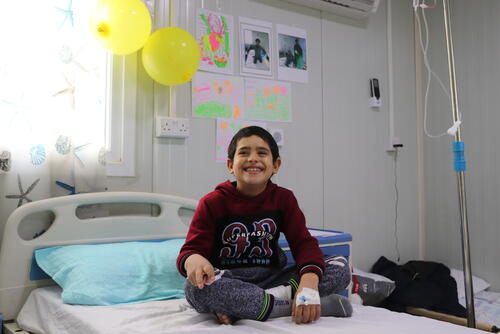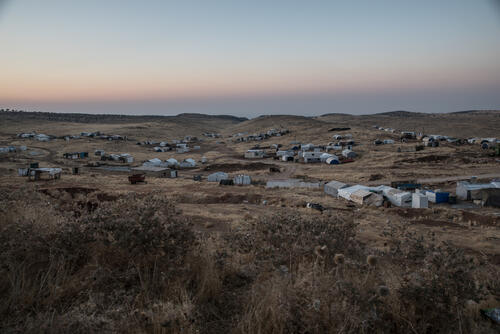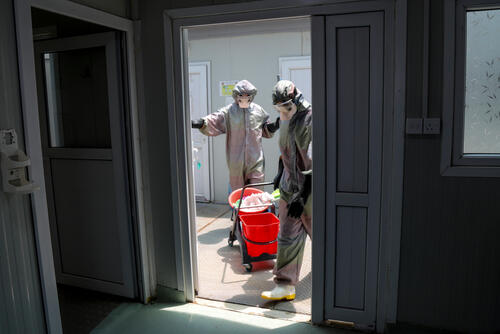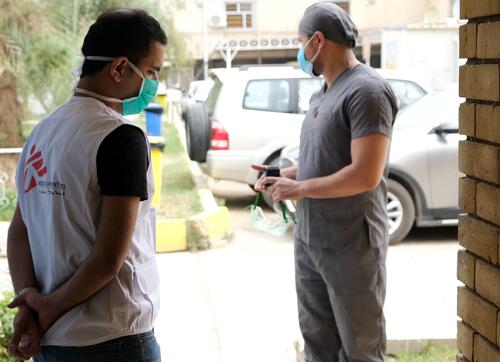The humanitarian needs in Iraq remain extremely high. Many health facilities lack medical supplies and healthcare specialists, and major public health services are overstretched. The healthcare system in some regions has been under considerable pressure at times due to violent crackdowns on mass protests and the ongoing COVID-19 pandemic.
MSF has been working in Iraq since 1991. Today, more than 1,800 staff work jointly to deliver general and specialised healthcare, services for expectant and new mothers, treatment for chronic diseases, surgery, post-operative care and rehabilitation for trauma patients, mental health support and health education activities.
Our teams provide healthcare support and services in Ninewa, Baghdad, Dohuk, Erbil, Kirkuk, Dhi Qar, Najaf and Basra governorates.
Protracted displacement
Since 2014, the conflict in Iraq has forced an estimated 5.7 million children and adults to leave their homes and seek shelter elsewhere. As of August 2021, nearly 5 million Iraqis had returned home, but nearly 1.2 million were still displaced.
Those who remain in camps for internally displaced people are often the poorest and most vulnerable, who can't afford to leave the camps and rebuild their destroyed homes. Others say they can’t go home because they don’t feel safe.
Despite this, in October 2020, authorities started closing camps for the displaced and returning people to their areas of origin. Laylan camp, where MSF was running a general healthcare centre and prepared a 20-bed COVID-19 treatment unit, closed in late November 2020. Several displaced people who were living in the camp told our teams that the sudden closure left them fearful for their own safety.
Before their departure from the camp, we supplied people with 3 months’ stock of medications for their chronic diseases.

Diverse medical needs
It’s estimated that around 50 per cent of Iraqis who have returned home, went back to areas with harsh living conditions . As a result, over two million people have little to no access to basic services. Places of return are also often characterised by residual insecurity, and damaged property and public infrastructure.
In many regions of the country, the healthcare system remains fragile with thousands of families struggling to access quality affordable healthcare.
Difficulty in accessing sexual and reproductive health services in some regions of the country, such as in Mosul and Sinuni, places pregnant women among the most vulnerable people. Newborns and children also lack specialised services close to home.
To respond to the high needs, MSF runs a specialised maternity unit in Nablus hospital, in the west of Mosul. Staff there provide maternal, neonatal and paediatric care; we also provide emergency room care and mental health consultations in the same hospital.
In Al-Rafadain healthcare centre, also Mosul, MSF teams provide routine obstetric and newborn care, as well as mental health services.
Many people returning home to Mosul have suffered war-related injuries, while others are subjected to violence or accidental trauma. Our post-operative care facility in east Mosul provides surgical and rehabilitative care, as well as mental health services.

In Sinuni General hospital, we run emergency, maternity, and paediatric services. We also provide mental healthcare, treatment for non-communicable diseases and run health promotion activities in Abassi and Hawija, Kirkurk governorate, for families returning to the area.
Addressing invisible scars
MSF teams have witnessed prevalent mental health needs among our patients in our different areas of work in Iraq.
We have incorporated mental health services into our rehabilitative projects in Mosul and Baghdad, and in our two maternity wards in Mosul. Our teams support the invisible scars of trauma patients throughout their recovery process in the two cities.
In Sinuni, our teams have found that mental health was a huge unmet need in the area, especially among people returning home. We offer comprehensive mental health services, including psychiatric and psychological care, as well as group sessions and activities for the villages around Sinuni.
In Kirkuk governorate, we provide mental health support, including both psychological and psychiatric care, to displaced people, the host community and people who have returned to their homes in the area.

Improving diagnosis and treatment of drug-resistant tuberculosis
MSF has supported the National Tuberculosis Programme since 2018. The programme aims to improve case detection, provide better tolerated and effective treatment for drug-resistant tuberculosis (DR-TB) patients, and improve the quality of care.
MSF provides patient monitoring tools, counselling sessions for patients, and education sessions about TB for patients and their families. Our teams also provide staff and helped build technical and laboratory capacity to improve TB/DR-TB case finding at the National Reference Laboratory. We also work to improve treatment adherence and patient care at Al-Rusafa and Al-Sadr hospitals. In addition, we have contributed to the capacity building of TB specialists in Iraq through patient care and treatment training sessions and workshops.
MSF teams have focused their efforts on introducing new drugs for the treatment of DR-TB, to replace older, more painful treatment which includes injections. There are currently around 100 TB patients taking the oral treatment which includes the two newer TB drugs bedaquiline and delamanid.

COVID-19 preparedness
Since the beginning of the COVID-19 pandemic, we have maintained our lifesaving medical operations while enhancing infection prevention and control measures in our facilities. We have put in place triage and referral procedures to ensure the protection of patients and staff.
In support of local health authorities, we adjusted some of our activities to respond to the increasing need for COVID-19 treatment facilities.
Baghdad has been the city hardest hit by COVID-19 in Iraq. MSF teams have provided training on patient triage and infection prevention and control in two COVID-19 treatment centres (lbn Al-Khateeb and Al-Kindi). Our teams are working in a newly constructed 55-bed COVID-19 ward and intensive care unit in Al-Kindi hospital, where we treat people with critical cases of COVID-19.
In east Mosul, we temporarily repurposed our post-operative care centre between April and October 2020, to serve as a COVID-19 treatment centre. In late November 2020, we opened a 16-bed facility in Al-Salam Hospital in east Mosul for patients with severe COVID-19, which closed in March 2021.
In Ninewa, Erbil and Dohuk, MSF teams provided training sessions on infection prevention and control measures in hospitals, and donated infection prevention and control supplies and cleaning materials to six hospitals.




